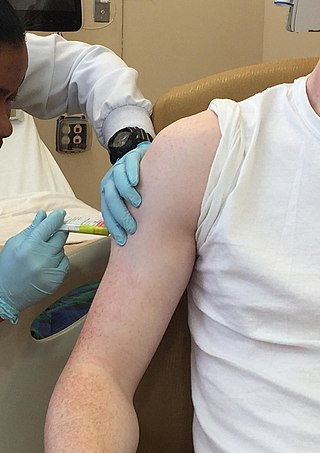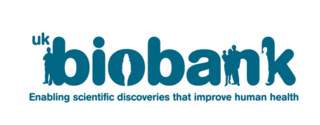Related Research Articles

Informed consent is a principle in medical ethics and medical law and media studies, that a patient must have sufficient information and understanding before making decisions about their medical care. Pertinent information may include risks and benefits of treatments, alternative treatments, the patient's role in treatment, and their right to refuse treatment. In most systems, healthcare providers have a legal and ethical responsibility to ensure that a patient's consent is informed. This principle applies more broadly than healthcare intervention, for example to conduct research and to disclosing a person's medical information.

A randomized controlled trial is a form of scientific experiment used to control factors not under direct experimental control. Examples of RCTs are clinical trials that compare the effects of drugs, surgical techniques, medical devices, diagnostic procedures or other medical treatments.

Clinical trials are prospective biomedical or behavioral research studies on human participants designed to answer specific questions about biomedical or behavioral interventions, including new treatments and known interventions that warrant further study and comparison. Clinical trials generate data on dosage, safety and efficacy. They are conducted only after they have received health authority/ethics committee approval in the country where approval of the therapy is sought. These authorities are responsible for vetting the risk/benefit ratio of the trial—their approval does not mean the therapy is 'safe' or effective, only that the trial may be conducted.

Human subject research is systematic, scientific investigation that can be either interventional or observational and involves human beings as research subjects, commonly known as test subjects. Human subject research can be either medical (clinical) research or non-medical research. Systematic investigation incorporates both the collection and analysis of data in order to answer a specific question. Medical human subject research often involves analysis of biological specimens, epidemiological and behavioral studies and medical chart review studies. On the other hand, human subject research in the social sciences often involves surveys which consist of questions to a particular group of people. Survey methodology includes questionnaires, interviews, and focus groups.

UK Biobank is a large long-term biobank study in the United Kingdom (UK) which is investigating the respective contributions of genetic predisposition and environmental exposure to the development of disease. It began in 2006.
An institutional review board (IRB), also known as an independent ethics committee (IEC), ethical review board (ERB), or research ethics board (REB), is a committee that applies research ethics by reviewing the methods proposed for research to ensure that they are ethical. Such boards are formally designated to approve, monitor, and review biomedical and behavioral research involving humans. They often conduct some form of risk-benefit analysis in an attempt to determine whether or not research should be conducted. The purpose of the IRB is to assure that appropriate steps are taken to protect the rights and welfare of humans participating as subjects in a research study. Along with developed countries, many developing countries have established national, regional or local Institutional Review Boards in order to safeguard ethical conduct of research concerning both national and international norms, regulations or codes.
The Declaration of Helsinki is a set of ethical principles regarding human experimentation developed originally in 1964 for the medical community by the World Medical Association (WMA). It is widely regarded as the cornerstone document on human research ethics.

A biobank is a type of biorepository that stores biological samples for use in research. Biobanks have become an important resource in medical research, supporting many types of contemporary research like genomics and personalized medicine.

In health care, a clinical trial is a comparison test of a medication or other medical treatment, versus a placebo, other medications or devices, or the standard medical treatment for a patient's condition.
The term informed assent describes the process whereby minors may agree to participate in clinical trials. It is similar to the process of informed consent in adults, however there remains some overlap between the terms.
Biobank ethics refers to the ethics pertaining to all aspects of biobanks. The issues examined in the field of biobank ethics are special cases of clinical research ethics.
Return of results is a concept in research ethics which describes the extent of the duty of a researcher to reveal and explain the results of research to a research participant.
Privacy for research participants is a concept in research ethics which states that a person in human subject research has a right to privacy when participating in research. Some typical scenarios this would apply to include, or example, a surveyor doing social research conducts an interview with a participant, or a medical researcher in a clinical trial asks for a blood sample from a participant to see if there is a relationship between something which can be measured in blood and a person's health. In both cases, the ideal outcome is that any participant can join the study and neither the researcher nor the study design nor the publication of the study results would ever identify any participant in the study. Thus, the privacy rights of these individuals can be preserved.
Clinical research ethics are the set of relevant ethics considered in the conduct of a clinical trial in the field of clinical research. It borrows from the broader fields of research ethics and medical ethics.
A community advisory board is a type of advisory board consisting of representatives of the general public who meet with representatives of an institution to relay information between the two groups. CABs are especially associated with clinical research, in which case they review the clinical research ethics associated with the human subject research which a medical research institution conducts. CABs are an aspect of community-based participatory research.
Respect for persons is the concept that all people deserve the right to fully exercise their autonomy. Showing respect for persons is a system for interaction in which one entity ensures that another has agency to be able to make a choice.
A research participant, also called a human subject or an experiment, trial, or study participant or subject, is a person who voluntarily participates in human subject research after giving informed consent to be the subject of the research. A research participant is different from individuals who are not able to give informed consent, such as children, infants, and animals. Such individuals are preferentially referred to as subjects.
Dynamic consent is an approach to informed consent that enables on-going engagement and communication between individuals and the users and custodians of their data. It is designed to address the many issues that are raised by the use of digital technologies in research and clinical care that enable the wide-scale use, linkage, analysis and integration of diverse datasets and the use of AI and big data analyses. These issues include how to obtain informed consent in a rapidly-changing environment; growing expectations that people should know how their data is being used; increased legal and regulatory requirements for the management of secondary use of data in biobanks and other medical research infrastructure. The concept has been developed in 2007 by an Italian group who introduced the concept of an ongoing process between researcher and participant where "technology now allows the establishment of dynamic participant–researcher partnerships." Dynamic Consent therefore describes a personalised, digital interface that enables two-way communication between participants and researchers and is a practical example of how software can be developed to give research participants greater understanding and control over how their data is used. It also enables clinical trial managers, researchers and clinicians to know what type of consent is attached to the use of data they hold and to have an easy way to seek a new consent if the use of the data changes. It is able to support greater accountability and transparency, streamlining consent processes to enable compliance with regulatory requirements.

Clinical trials in India refers to clinical research in India in which researchers test drugs and other treatments on research participants. NDCTR 2019 and section 3.7.1 to 3.7.3 of ICMR guidelines requires that all researchers conducting a clinical trial must publicly document it in the Clinical Trials Registry - India.
References
- ↑ Ondrusek, Nancy; Abramovitch, Rona; Pencharz, Paul; Koren, Gideon (1998). "Empirical examination of the ability of children to consent to clinical research". Journal of Medical Ethics. 24 (3): 158–65. doi:10.1136/jme.24.3.158. PMC 1377517 . PMID 9650109.
- ↑ Edwards, Sarah J.L. (2005). "Research Participation and the Right to Withdraw". Bioethics. 19 (2): 112–30. doi:10.1111/j.1467-8519.2005.00429.x. PMID 15943021.
- ↑ Eriksson, Stefan; Helgesson, Gert (2005). "Potential harms, anonymization, and the right to withdraw consent to biobank research". European Journal of Human Genetics. 13 (9): 1071–6. doi: 10.1038/sj.ejhg.5201458 . PMID 15986039.